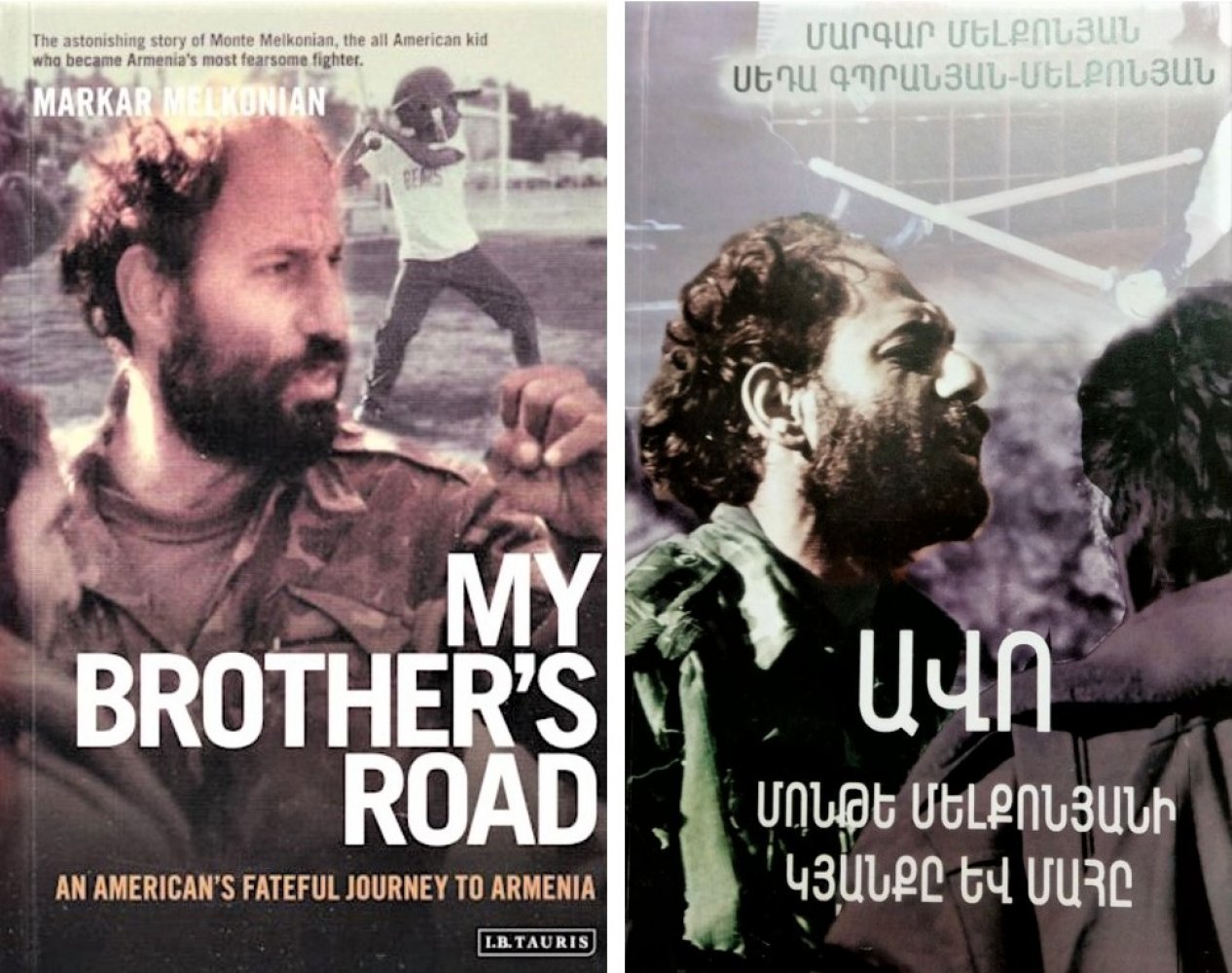
The brother of Monte Melkonian, whose name is included in the list of the most brutal terrorists in the world, writer Markar Melkonian, who lives in the US, wrote the book "My Brother's Road" in seven years. The book was first printed in 2005, and reprinted in 2007. The book which was translated into French, Russian and Armenian are not accepted in Armenia. After the book was published, in Armenia and the Armenian diaspora, they denied that this book was written by the terrorist's brother, and even described it as a product of Azerbaijani propaganda.
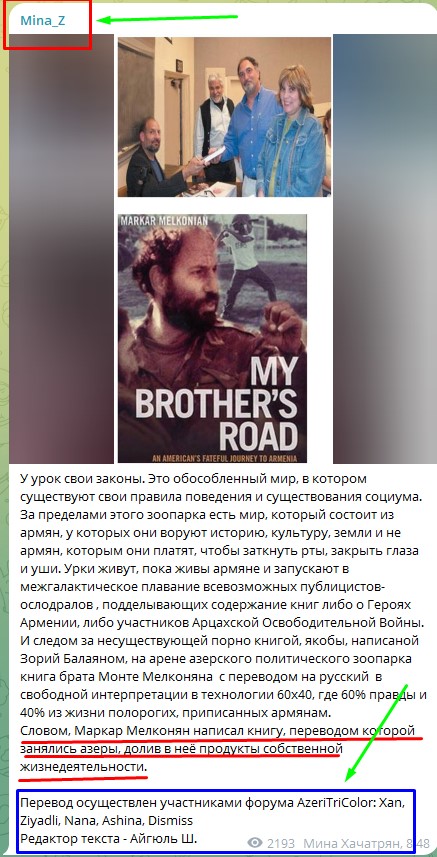
The reason for this is that Markar Melkonian revealed the terrible crimes of other Armenian bandits and criminals in order to "exonerate" his brother. For example, Manvel Yeghiazaryan, the commander of the terrorist group "Arabo", which participated in the Khojaly massacre, said that he was very angry that Markar Melkonian wrote such a book, saying that he, as an Armenian, should not write such information (source).
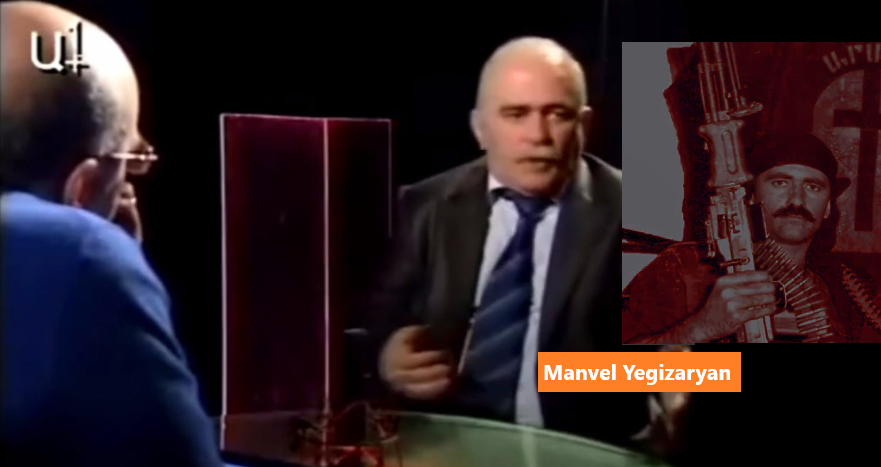
In recent days, many sources have reported that serious distortions have been made in the translation of the English-language book "My Brother's Road" ("Avo: The Life and Death of Monte Melkonian" in Armenian), many facts have been changed, and some parts have been removed altogether.
The Armenian editorial staff of Faktyoxla Lab. has investigated this fact.
Markar Melkonian's autobiographical book about his terrorist brother was presented for the first time on February 27, 2005 at the Hayashen Center in London. On the same day of the presentation, The Voice of Nor Serount newspaper interviewed the author about the book. In the interview, Markar Melkonian informed about the life of his brother, the idea of writing the book, the time spent on its preparation and clarified many fragments mentioned in the book.
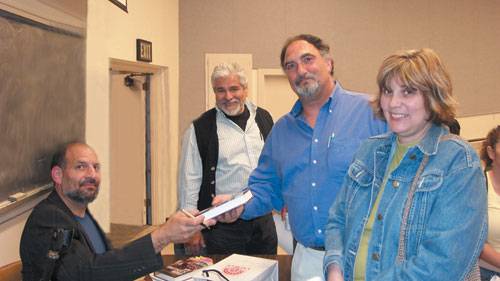
He said that he spent seven years and three months to write the book, during which he visited all the regions where Monte Melkonian was involved in the bloody wars in Karabakh and had a detailed conversation with his comrades-in-arms. According to him, he was helped in writing the book by Seta Melkonian, the friend of the terrorist, who was always with Monte and whose sharp memory played an invaluable role in remembering many facts, confirming or denying events.
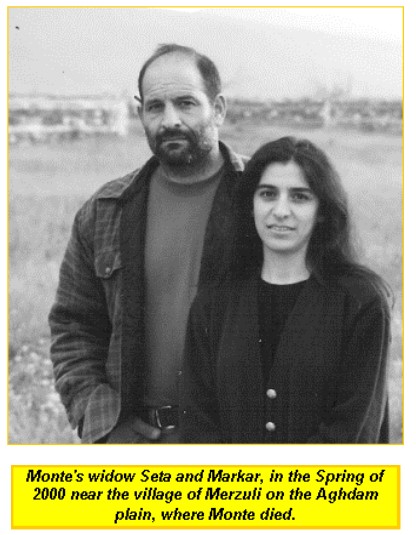
We mention these points in order to show once again that the claims of Armenian media and social media influence leaders that the book was changed and even written at the dictation of Azerbaijan are unfounded and fabricated.
The book, as mentioned, has been translated into French, Russian and Armenian languages.
The material from this page, where the French version of the book is distributed, has been removed for reasons unknown to us.
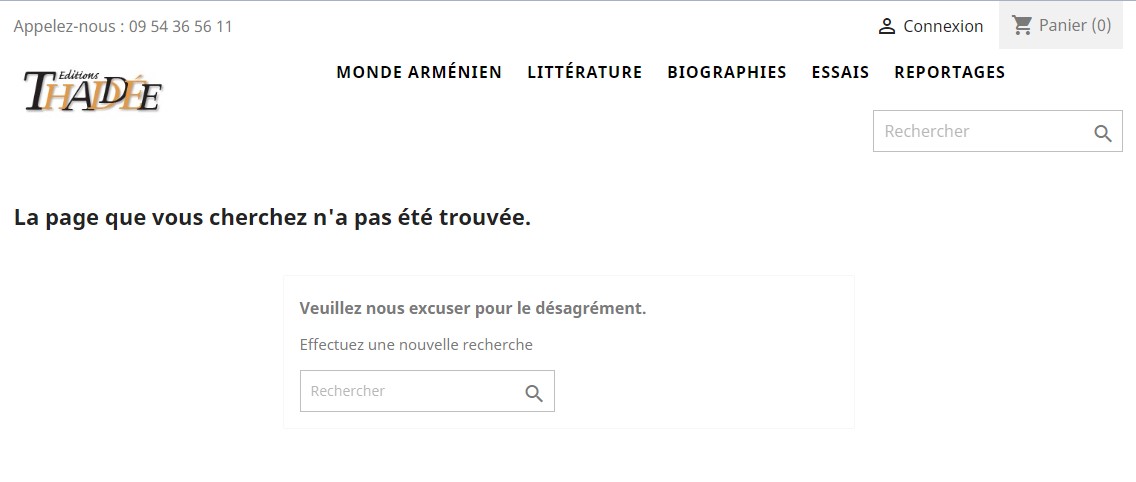
The English version has been removed from this resource.

Now let's come to the points that have been changed in the Armenian version. Thus, we have an electronic version of the book in two languages (English and Armenian). Comparisons of the facts we bring can be explored from these resources.
As a result of research, we found out that the most changes in the Armenian version were made in chapter 15, that is, in the section "Disciplinary Problems." It should be noted in advance that the expressions in English have not been edited, but are presented as written in the original:
Fact 1.
|
In English version of the book |
In Armenian version of the book |
|
In mid-February, Monte and his Patriotic Detachment bivouacked at Mehdishen, a village just north of Stepanakert and well outside of the Martuni district, to conduct more reconnaissance, this time for a planned attack against the nearby town of Khojalu. With 6,000 inhabitants, Khojalu was the second-largest Azeri town in Mountainous Karabagh, after the citadel of Shusha. The Azeris in Khojalu controlled Mountainous Karabagh's only airstrip, and gunners there cut off two main roads through the area, one to the east and one to the north. For the most part, though, the armed presence in Khojalu was defensive. It consisted of about forty OMON fighters plus a "self-defense group" of anywhere between sixty and 200 men, mostly conscripts with little training. |
This part was removed: For the most part, though, the armed presence in Khojalu was defensive. It consisted of about forty OMON fighters plus a "self-defense group" of anywhere between sixty and 200 men, mostly conscripts with little training. |
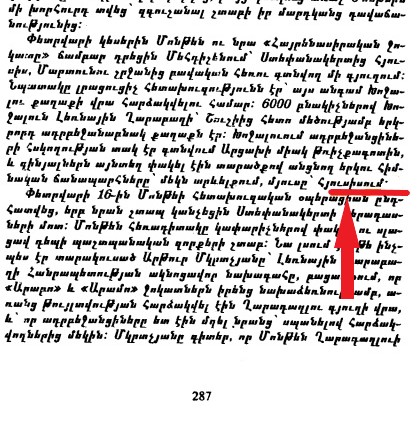
Fact 2.
|
In English version of the book |
In Armenian version of the book |
|
On February 16, Monte's recon operation came to a halt when he received an urgent summons from his superiors in Stepanakert. He put the caps on his binoculars and raced off to the Defense Forces headquarters, located in a former train station on Freedom Fighter Boulevard in Stepanakert. While he listened slack-jawed, Artur Mkrtchyan, the bespectacled President of the Mountainous Karabagh Republic, explained that the Arabo and Aramo detachments had just attacked the village of Karadaghlu on their own initiative and without permission, and that Azeri defenders had repulsed them, killing one of the attackers in the process. Mkrtchyan knew that Monte had conducted reconnaissance at Karadaghlu, and so he asked him to finish the operation that the renegade detachments had botched. |
In the sentence “Mkrtchyan knew that Monte had conducted reconnaissance at Karadaghlu, and so he asked him to finish the operation that the renegade detachments had botched,” the word “rebel” was written instead of “renegade.” |
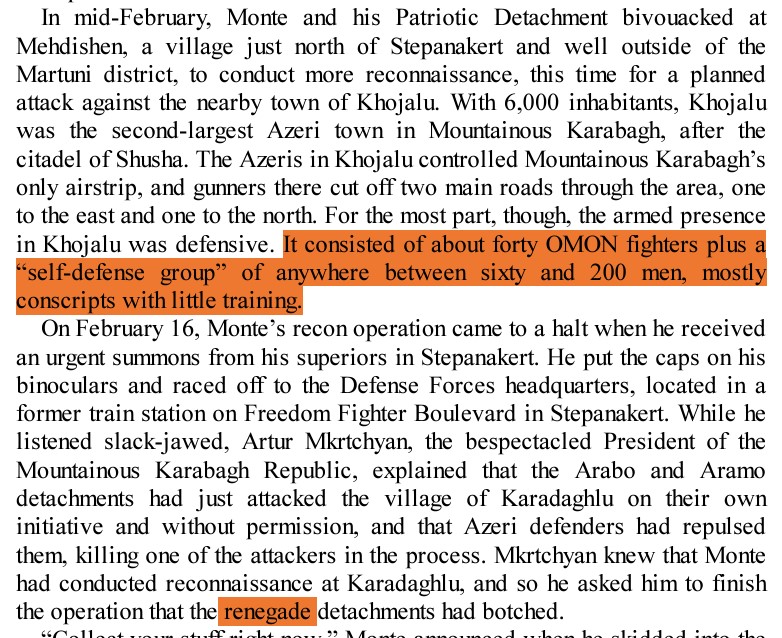
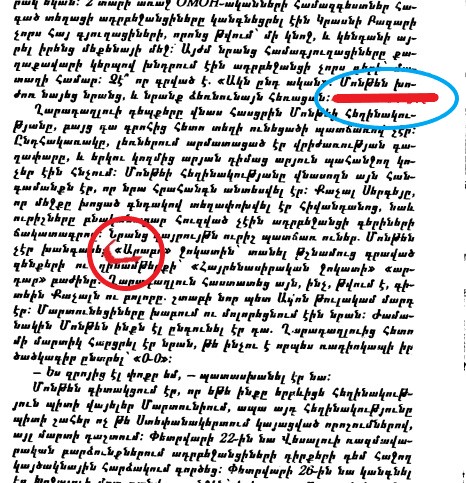
Fact 3.
|
In English version of the book |
In Armenian version of the book |
|
It appeared as though Karadaghlu, the first battle Montle had officially been charged with commanding, had proceeded smoothly to its conclusion. Soon, however, things changed. Arabo and Aramo fighters shoved thirty- eight captives, including several women and other noncombatants, into a ditch on the outskirts of the village. One of the captives in the ditch pulled the pin from a grenade concealed under a bandaged hand and tossed it, taking off the lower leg of one of his captors, a recent Patriotic Detachment recruit named Levon. |
The phrase “including several women” was removed from the sentence “Arabo and Aramo fighters shoved thirty- eight captives, including several women and other noncombatants, into a ditch on the outskirts of the village.” |
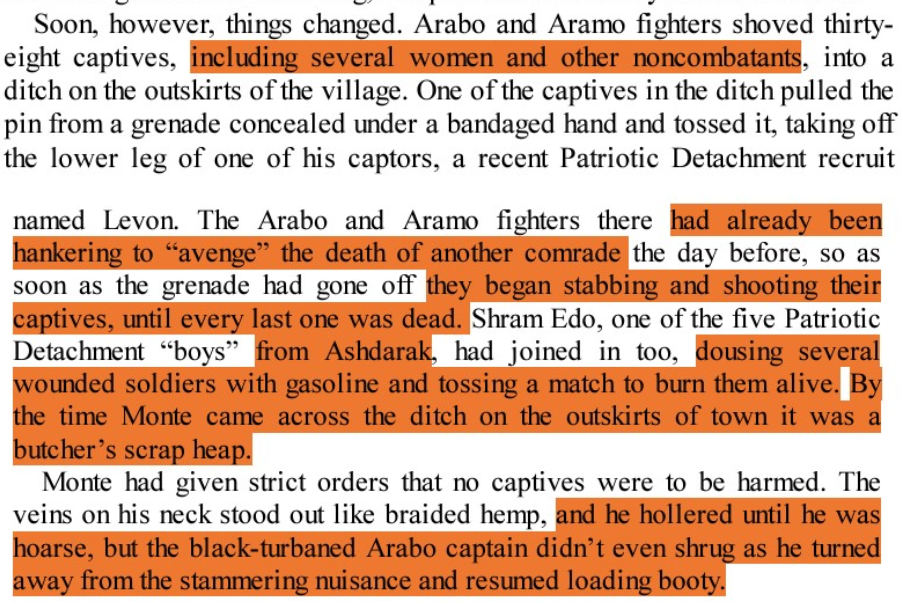
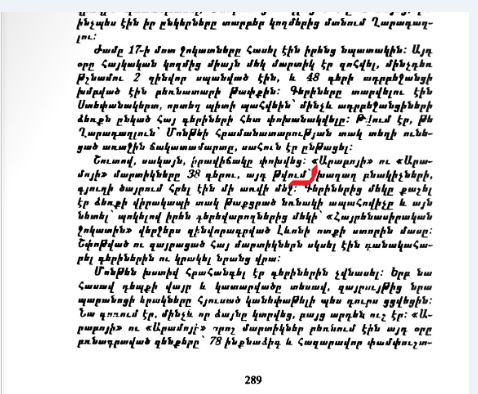
Fact 4.
|
In English version of the book |
In Armenian version of the book |
|
The Arabo and Aramo fighters there had already been hankering to "avenge" the death of another comrade the day before, so as soon as the grenade had gone off they began stabbing and shooting their captives, until every last one was dead. Shram Edo, one of the five Patriotic Detachment "boys" from Ashdarak, had joined in too, dousing several wounded soldiers with gasoline and tossing a match to burn them alive. By the time Monte came across the ditch on the outskirts of town it was a butcher's scrap heap. Monte had given strict orders that no captives were to be harmed. The veins on his neck stood out like braided hemp, and he hollered until he was hoarse, but the black-turbaned Arabo captain didn't even shrug as he turned away from the stammering nuisance and resumed loading booty. |
The first sentence has been changed to "The fighters from the Patriotic Detachment started shooting the prisoners and stabbing them." The sentence “Shram Edo, one of the five Patriotic Detachment "boys" from Ashdarak, had joined in too, dousing several wounded soldiers with gasoline and tossing a match to burn them alive. By the time Monte came across the ditch on the outskirts of town it was a butcher's scrap heap” was completely removed. The part “but the black-turbaned Arabo captain didn't even shrug as he turned away from the stammering nuisance and resumed loading booty” was edited. Instead, in the Armenian translation, the idea ends with the sentence "but it was too late." The goal is to acquit Manvel Yeghiazaryan, the leader of the Arabo gang. |
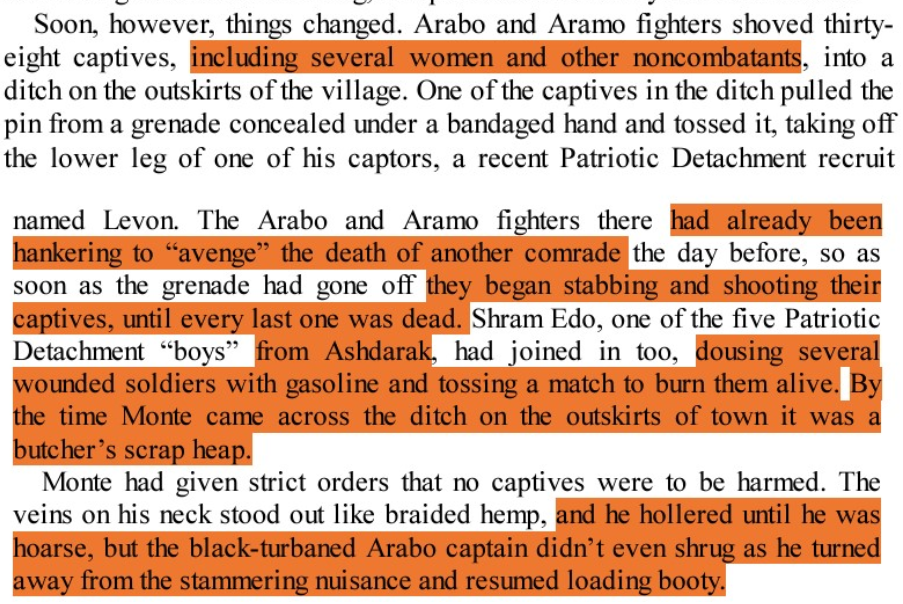
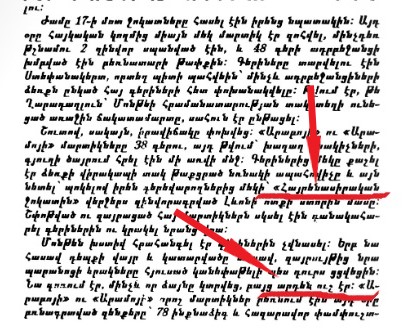
Fact 5.
|
In English version of the book |
In Armenian version of the book |
|
The Arabo and Aramo detachments hauled off all the weapons captured that day-seventy-eight rifles plus thousands of rounds of ammunition and they emptied the village warehouse, too, dragging out tons of bagged wheat to sell. After the looting, they set the village ablaze. A total of fifty-three Azeris were killed in and around Karadaghlu during those two days, compared to three killed on the Armenian side, including a sixty-year-old villager in Haghorti who had been hit by a stray bullet. |
The second and the third sentences were removed altogether: After the looting, they set the village ablaze. A total of fifty-three Azeris were killed in and around Karadaghlu during those two days, compared to three killed on the Armenian side, including a sixty-year-old villager in Haghorti who had been hit by a stray bullet. |

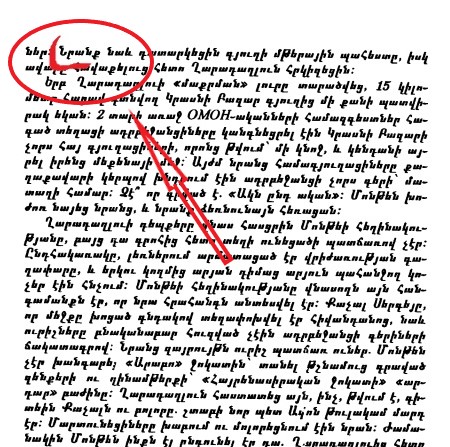
Fact 6.
|
In English version of the book |
In Armenian version of the book |
|
Now they fellow villages politely requested four of the Azeri captives for madagh-a blood sacrifice. It was written, an eye for an eye. Monte scowled them down, and they left empty-handed. More than fifty Azeri captives had been butchered at Karadaghlu. But it was not the butchery that damaged Monte's reputation among the Karabagh mountain people. On the contrary, vengeance ran deep in the mountains, and the loudest voices on both sides demanded blood for blood. What damaged Monte's reputation, rather, was the fact that the butchery at Karadaghlu had taken place against his orders. Kechel Sergei, who had been evacuated to a hospital with a bullet through the back, could not have cared less about Azeri casualties; what infuriated him were reports that Monte had not prevented Arabo Manvel from hauling off the Patriotic Detachment's split of the captured munitions. |
This paragraph was removed altogether: More than fifty Azeri captives had been butchered at Karadaghlu. But it was not the butchery that damaged Monte's reputation among the Karabagh mountain people. On the contrary, vengeance ran deep in the mountains, and the loudest voices on both sides demanded blood for blood. The word “Manvel” was removed from the sentence in the 3rd paragraph “what infuriated him were reports that Monte had not prevented Arabo Manvel from hauling off the Patriotic Detachment's split of the captured munitions.” We are talking about the commander of "Arabo", the murderer Manvel Yeghiazaryan. |
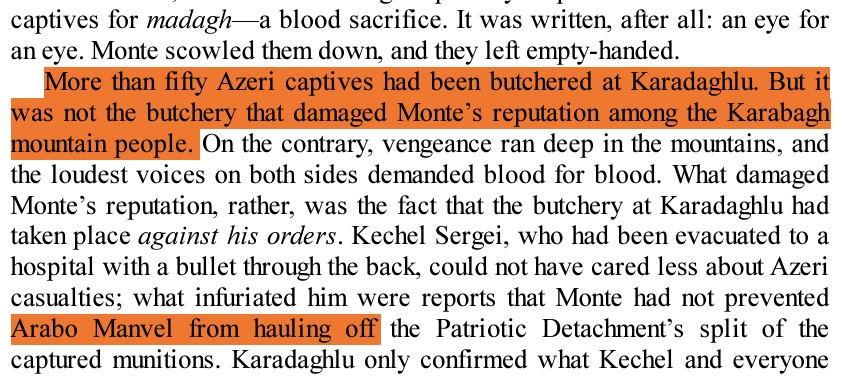
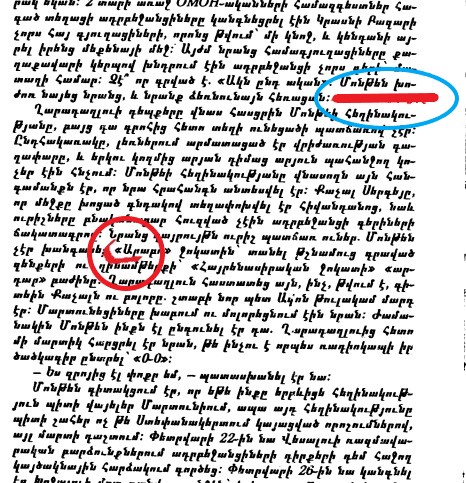
Fact 7.
|
In English version of the book |
In Armenian version of the book |
|
Monte realized that if he ever were to exercise authority in Martuni, he would have to gain that authority not by decree from Stepanakert, but on the battlefield. On February 22, he led a successful lightning attack against Azeri positions on the strategic heights of Vesalu. But a few days after the victory at Vesalu, he faced even more brazen insubordination, with even bloodier results than Karadaghlu. |
The last sentence – “But a few days after the victory at Vesalu, he faced even more brazen insubordination, with even bloodier results than Karadaghlu” was removed. |
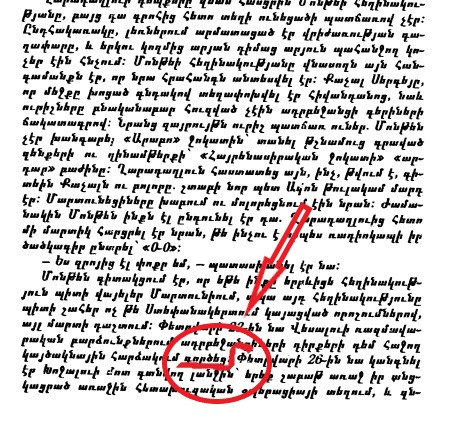
Fact 8
|
In English version of the book |
In Armenian version of the book |
|
On February 26, he stood on a slope near Khojalu, the site of his first recon operation three weeks earlier, and surveyed a trail of bloody shawls strewn across the brown grass and snow. As soon as he had arrived at Khojalu in response to reports of fighting, he had begun piecing together the story of the massacre that had just wound down, perhaps only an hour before his arrival. As soon as he had arrived at Khojalu in response to reports of fighting, he had begun piecing together the story of the massacre that had just wound down, perhaps only an hour before his arrival. At about 11:00 p.m. the night before, some 2,000 Armenian fighters had advanced through the high grass on three sides of Khojalu, forcing the residents out through the open side to the east. By the morning of February 26, the refugees had made it to the eastern cusp of Mountainous Karabagh and had begun working their way downhill, toward safety in the Azeri city of Agdam, about six miles away. There, in the hillocks and within sight of safety, Mountainous Karabagh soldiers had chased them down. "They just shot and shot and shot," a refugee woman, Raisha Aslanova, testified to a Human Rights Watch investigator. The Arabo fighters had then unsheathed the knives they had carried on their hips for so long, and began stabbing. Now, the only sound was the wind whistling through dry grass, a wind that was too early yet to blow away the stench of corpses. Monte had arrived in Martuni twenty-two days earlier, and since then he had staggered across two killing fields soaked with the fresh blood of captives and unarmed peasants. When it came to adult males, fighters on both sides seldom distinguished between combatants and noncombatants. But until Khojalu, Armenian fighters had spared women and children, either releasing them or holding them hostage for prisoner exchanges. On this score, they had a better track record than their enemies. The attack at Khojalu, however, had gone some distance to even the score. Monte crunched over the grass where women and girls lay scattered like broken dolls. "No discipline," he muttered. He knew the significance of the day's date: it was the run-up to the fourth anniversary of the anti-Armenian pogrom in the city of Sumgait. Khojalu had been a strategic goal, but it had also been an act of revenge. |
The part after the first sentence was completely removed: “As soon as he had arrived at Khojalu in response to reports of fighting, he had begun piecing together the story of the massacre that had just wound down, perhaps only an hour before his arrival. At about 11:00 p.m. the night before, some 2,000 Armenian fighters had advanced through the high grass on three sides of Khojalu, forcing the residents out through the open side to the east. By the morning of February 26, the refugees had made it to the eastern cusp of Mountainous Karabagh and had begun working their way downhill, toward safety in the Azeri city of Agdam, about six miles away.” Monte crunched over the grass where women and girls lay scattered like broken dolls. "No discipline," he muttered. He knew the significance of the day's date: it was the run-up to the fourth anniversary of the anti-Armenian pogrom in the city of Sumgait. Khojalu had been a strategic goal, but it had also been an act of revenge. |
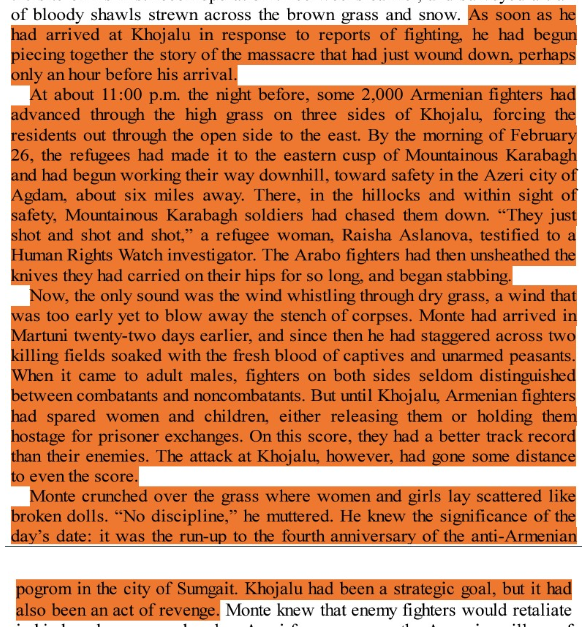
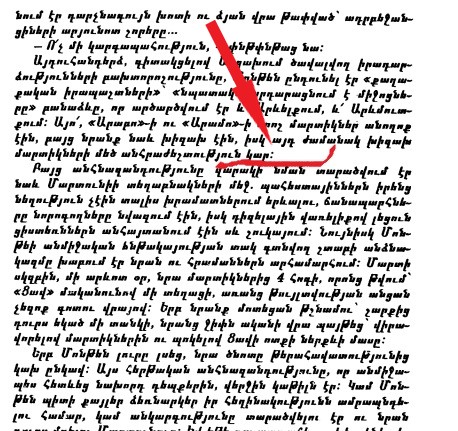
Fact 9
|
In English version of the book |
In Armenian version of the book |
|
Convinced of the supremely high stakes in Mountainous Karabagh, Monte had accepted the ends-justifying-means calculations of all "political realists," East and West: the Arabo and the Aramo were bloodthirsty, yes, but they were also brave fighters, at a time when there was a desperate need for brave fighters. After Khojalu, though, what shocked Monte was that they were unwilling to set vengeance aside, even for the sake of Armenian hostages in Azeri hands. Eventually, Monte would convince his superiors in Stepanakert to expel the Arabo and Aramo Detachments from Martuni. But he never succeeded in convincing them to disband these brutal detachments or to expel them altogether from Mountainous Karabagh before they killed again. |
This part was completely removed: After Khojalu, though, what shocked Monte was that they were unwilling to set vengeance aside, even for the sake of Armenian hostages in Azeri hands. Eventually, Monte would convince his superiors in Stepanakert to expel the Arabo and Aramo Detachments from Martuni. But he never succeeded in convincing them to disband these brutal detachments or to expel them altogether from Mountainous Karabagh before they killed again. |
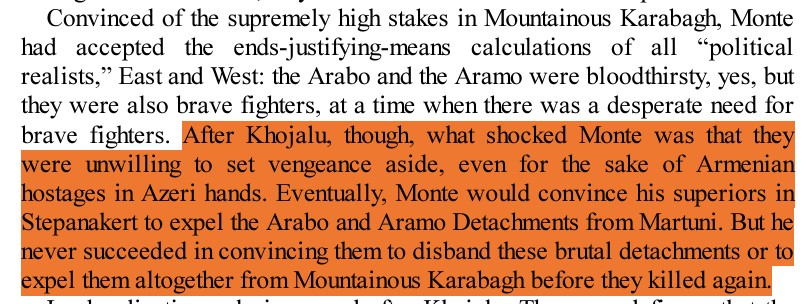
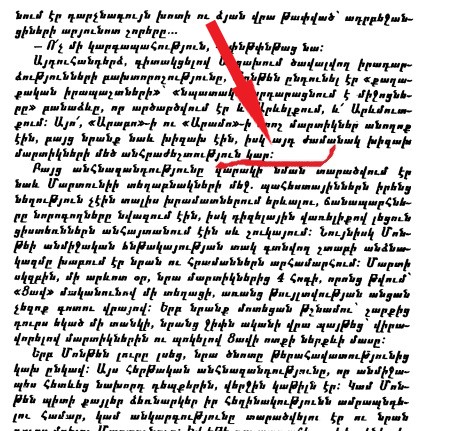
Apparently, the version of Markar Melkonian's book "My Brother's Road" translated into Armenian language is completely distorted, and Armenian publishers didn't want the crimes of their compatriots who committed the Khojaly and Garadaghli genocides to be revealed, or rather, didn't want Armenian readers to learn the truth.




















